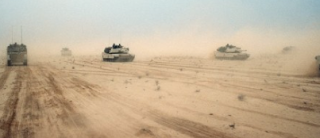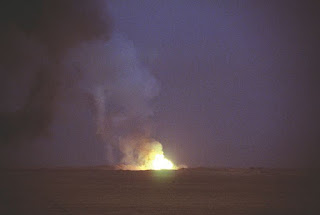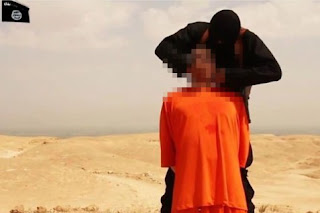Gog against God:
An Exposition and Study of Ezekiel 38-39
and they that hate thee have lifted up the head.
They have taken crafty counsel against thy people [Israel],
and consulted against thy hidden ones.
They have said, Come, and let us cut them off
from being a nation;
that the name of Israel may be no more in remembrance.
—Emphasis added, Psalm 83:2-4, KJV.
Introduction
The planet is in crises—political, military, economical, ecological, societal, spiritual, and more. According to news reports, crises seem to be popping-up all over the planet, especially in the volatile Middle East where, despite multiple attempts of western governments to bring peace to that region, the conflict between Israel, the Palestinian State and militant Islam defies solution. ISIS (Islamic State of Iran and Syria) now wages war to establish an Islamic Caliphate, and Iraq continues its quest, with the approval of western nations, to develop nuclear weaponry. If successful, Iran’s possession of this weaponry will further destabilize that volatile region of the world.[1]
Russia and Iran
With Iran closing in on becoming a nuclear power, the question becomes whether for the sake of national survival Israel will tolerate an enemy nation like Iran possessing a weapon to blast Jerusalem and its environs into extinction. If Israel decides to attack Iran’s developing nuclear installations, there is no telling how interested and surrounding nations or Islamic terrorist groups will react (i.e., Russia, Turkey, Afghanistan, Pakistan, Iraq, Jordan, Saudi Arabia, ISIS, etc.). In an attempt to protect its economic interests in that area of the world, will Russia in alliance with Shiite Arab nations it supports, lead an invasion of the Holy Land?
Based upon Vladimir Putin’s seizure of Crimea, his continuing agitation in eastern Ukraine, and the Kremlin’s support of the militant Islamic Shiite Resistance Alliance (i.e., Assad’s Syria, Iran and Hezbollah in Palestine), one observer thinks Russia’s real geo-political agenda is southward and involves establishing its hegemony in the Middle East.[2] With its economy in shambles for reason of western economic sanctions against her, Russia has her eye upon the Middle East’s wealth. To get cash for his strapped economy, Putin recently sold Iran sophisticated S-300 surface-to-air missiles that could make Iran invulnerable to an air attack by Israel or other nations.[3] Despite the U.S. State Department’s lame protest, and B.B. Netanyahu’s warning that the sale “could further undermine the stability of the Middle East,” the deal between Russia and Iran was signed.[4] So as Iran develops a nuclear bomb, it awaits delivery of a defensive weapons system that will make its nuclear development facilities invulnerable to attack by air.
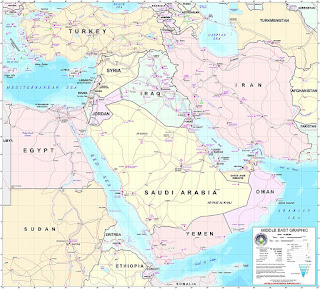 |
| Map of Mideast conflict areas |
Crazy Diplomacy
For many years economic sanctions have been levied against Iran by western nations. Though suffering from these sanctions, Iran continued to export and support terrorism in the Middle East. In 2010, Putin withdrew his offer to sell Iran the S-300 missiles. Now five years later, western nations, following the lead of the Obama administration and Secretary of State John Kerry, have brokered a treaty with Iran, an agreement which lifts economic sanctions and pours billions of dollars into Iran’s economy. Because of Iran’s sudden new found wealth, Russia, economic woes outstanding, seized the opportunity to reinitiate the deal with Iran to purchase the sophisticated air-defense missile system by which to defend itself against any air attack Israel might launch. The treaty also allows Iran to obtain nuclear weaponry in the future. And for all this, there’s talk of giving John Kerry a Nobel Peace Prize! Is this not crazy diplomacy? Yet all of this appears to be coming down as the biblical prophets predicted 1000s of years ago.
Millennia ago, ancient Hebrew prophets predicted the geo-political alignment of nations that can be observed today. In the “latter days” Ezekiel saw that to Israel’s north, east and south, perennial enemies would unite to invade the Jewish state, plunder her wealth and attempt to drive her re-gathered people from the land.
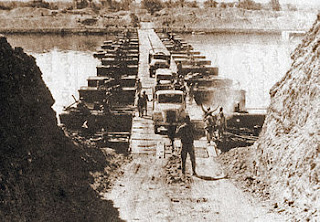 |
| The Yom Kippur War, 1973 |
“A Cup of Trembling”
Since the Balfour Declaration (1917) and the United Nations’ approval of Resolution 181 on 29 November 1947, Israel’s right to exist as a nation has been recognized by most nations in the international community. Yet correspondingly and as reflected in the 1947 UN vote, the Arab world and its allies implacably refuse to accept the legitimacy of the Israeli state. The contest over Israeli sovereignty appears increasingly unsolvable, especially in the aftermath of three major wars (the War for Independence, 1948-1949; the Six-Day War, 1967; and the Yom Kippur War, 1975) and ongoing terrorist bombings, assassinations and attacks inspired by the terrorist organizations like Hamas, whose recent missile attacks (Summer of 2014) provoked Israel’s invasion of Gaza. Militant and radical Islam’s goal (to “wipe Israel off the map”), especially with the potential of ISIS establishing an Islamic Caliphate to Israel’s north and west, seems realistic. What is at stake in this conflict as Prime Minister Benjamin Netanyahu has stated, is Israel’s national survival.
In short, Israel’s neighborhood is not friendly and that nation has few, if any, real allies in the world. Yet this is the situation that the prophet Zechariah predicted would develop. “Behold,” the Lord said, “I will make Jerusalem a cup of trembling unto all the people round about” (Emphasis added, Zechariah 12:2). The current situation surrounding the Holy Land—and let’s not be confused on this point—is of Jehovah’s making! “I will make Jerusalem a cup of trembling,” He decreed. (Compare Daniel 9:24-27.) Jerusalem and her environs are the epicenter for the fulfillment of biblical prophecy!
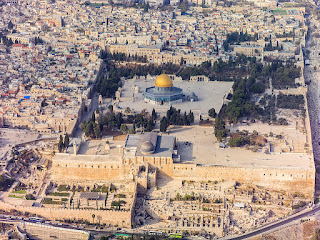 |
| Aerial view of the Temple Mount |
Ezekiel: the Prescient Prophet
Ezekiel chapters 38-39, detail a grand alliance of nations that “in the last days” will invade Israel. The leader of the invasion will hail “from the remotest parts of the north” (Ezekiel 39:2; 38:15, NASB). Though diverse in many other respects, one objective unites the invading confederation—to control the Middle East by extinguishing the nation thought to be the obstacle to peace and prosperity; the people the Lord calls “My people” and the territory the Lord calls “My land” (i.e., Israel, Ezekiel 36:5; 38:14, 16). If God’s ancient promises remain true in our modern word—and they do—then in their continuing war against God, nations will remain perpetually bent upon destroying the Lord’s people and controlling their land. Their objective: to nullify the promises of God to Israel and shame the name of the Lord. Therefore, as Holy Scripture bears witness, the ultimate contest in the Middle East is between God and the nations who hate Him and His people. In this international contest nothing less than the glory and honor of God are at stake!
The strife in the Middle East is playing out before our very eyes because God, through Ezekiel and other of the Hebrew prophets, decreed it—“desolations are determined” (Daniel 9:26). As we look at the relevance of Ezekiel’s description of the invasion of the end, chapters 38-39 of that prophecy should be allowed to speak for themselves without setting preconditions, without allowing interpretive bias or a theological system (i.e., replacement theology which proposes that the church has completely replaced Israel in the plan of God, contra Romans 11:1 ff.) to become a paradigm for interpreting them.
One commentator, perhaps of a “post” or “a” millennial bent of mind, skeptically states that “little sense” emerges “from the chapters as a whole.”[5] Another scholar calls the chapters (Ezekiel 38 and 39), which vividly describe the devastation of the invading armies, “cartoon-strip scenarios.”[6] He compares the account of the invasion’s aftermath—human corpses ravaged by “scavenging birds and animals”—to “some wild cartoon.”[7] I disagree. I think that without imposing ecclesiastical, eschatological or interpretive bias against them, the sense of the chapters ought to speak for itself.
So to understand Ezekiel’s prophecy about the invasion of the end, we will ask the chapters the following questions: First, where will the invasion take place? Second, when, broadly speaking, will the invasion take place? Third, who will invade the Holy Land? Fourth, why will the invaders invade? Fifth, what will happen to the invaders? And sixth, what’s the big deal? We begin with question one.
1. Where will the invasion take place?
In order to understand where the invasion will take place, the importance of one geographical place in the world must be understood. Though “the earth is the Lord’s” (Psalm 24:1), there is a particular place in our chaotic world where God chose to commence, continue and complete His redemptive plan, a plan which includes the incarnation, death-atonement for sin, burial, resurrection and return of Jesus Christ. In telescopic fashion, we narrow the focus of God’s redemptive plan for earth by centering first on the land and its people.
A Land
God chose Abraham’s descendants and the Holy Land to be the people through whom and the place from where He would initiate bestowal of spiritual blessing upon the world. Like the Normandy Invasion by the Allies on June 6, 1944, the people and the land God chose would serve as a beachhead and conduit for God to launch His redemptive plan for the world. To that effect, God made a covenant with Abraham. It reads:
(Emphases added, Genesis 12:1-3, KJV)
The land the Lord chose for Abraham and his descendants to settle and possess was ancient Canaan known today as Israel and Palestine (Genesis 13:15, 17; 15:7). The Lord decreed that through Abraham’s descendants, through Isaac the son of promise (Genesis 17:16-22; Galatians 4:21-31), and from that location He would historically commence, continue and complete the revelation of Himself to the world. With this intent, the Lord would choose a particular place to dwell with Abraham and Isaac’s descendants. The telescoping narrows….
A Place
After the Exodus and before ancient Israel’s conquest of Canaan, the Lord instructed Israel through the prophet Moses: “But you shall seek the Lord at the place which the Lord your God will choose from all your tribes, to establish His name there for His dwelling, and there you shall come” (Emphasis added, Deuteronomy 12:5). What place in the land would the Lord separate unto Himself? It would be a specific mount within the territory belonging to the family of Abraham’s great-great grandson, the grandson of Isaac, and the son of Jacob—Judah.
A City
As many state histories will attest, in the process of choosing a state capital was often politicized and contested. But with the city that would be the capital of ancient Israel there would be no contest for the Lord chose Jerusalem to be the hub of Israel. As the historian recorded the Lord’s statement about His choice: “Since the day that I brought My people from the land of Egypt, I did not choose a city out of all the tribes of Israel… but I have chosen Jerusalem that My name might be there” (2 Chronicles 6:5). The Lord said also through the Prophet Ezekiel: “Thus says the Lord God, ‘This is Jerusalem; I have set her at the center of the nations, with lands around her’” (Ezekiel 5:5). The people chose other idolatrous locations like Dan to the north and Bethel to the south, but Jerusalem was the location the Lord chose that His name would be honored there. But God also narrowed His choice to a particular place where He in the city would choose to dwell, a neighborhood so to speak.
A Mount
Ancient pagans believed the gods dwelt in the mountains. So to worship their gods, they built high places on them. But the one Lord separated Himself from such superstitious and idolatrous beliefs by selecting one mount in Israel where He would come to dwell with His people—Mount Zion. The Psalms indicate that of all the tribes of Israel, the Lord “chose the tribe of Judah” (Psalm 78:68); that of all the mountains in the land, “The Lord hath chosen Zion; he hath desired it for his habitation” (Psalm 132:13). In Judah and on Mount Zion a Temple would be built to honor and worship Yahweh, the one true God. SIDEBAR: To the point of God’s choice, we might note the fraudulent mimicry of Mormonism which relocates Zion to be either Independence, Missouri, or Salt Lake City, Utah, and builds temples (the cult’s high places) all over the world.
A Temple
That His name might be honored, the Lord God allowed Solomon to build a Temple to remind the nation of His choice of and presence with Israel. After the king built the Temple on Mount Zion and after the dedicatory ceremony, prayer and bringing the Ark of the Covenant to it (1 Kings 8:1-66), the “LORD appeared to Solomon by night, and said unto him, I have heard thy prayer, and have chosen this place to myself for an house of sacrifice” (Emphasis added, 2 Chronicles 7:12). Though Solomon built it, the Lord confirmed to the king that the Temple he had built would house His glorious presence (1 Kings 8:27).
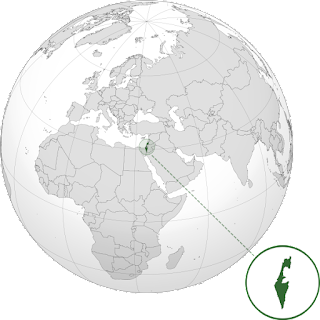 |
| Israel at the center. Follow a line straight north on this map. |
A Center
Illustrating the telescoping focus upon the place where the Lord chose and will chose again to dwell (i.e., the World, Canaan, Judah, Jerusalem, Mount Zion, and the Temple), there’s an old rabbinical saying which goes like this:
The world is like an eye. The white of the eye is everywhere else. The iris is Israel. The pupil is Jerusalem. But, ah, the gleam in the center of the pupil, that is the Temple Mount—that is Mount Moriah.[8]
For reason of the sovereign God establishing the beachhead for His redemptive work in this geographical place, He informs Gog that he will be invading a land that is “the navel” or “the center” (spiritual, not geographical, ed. comment) of the world (Ezekiel 38:12, KJV, NASB). The Lord had chosen this location and these ethnic people to be “a kingdom of priests and a holy nation” (Exodus 19:5-6). Through them He would channel His spiritual blessing to the world which involved not only the great salvation events of Jewish history, but also the incarnation, atoning death and resurrection of the Lord Jesus Christ. This great salvation will be completed when in fulfillment of the messianic promises, the Lord Jesus Christ returns in glory to the Mount of Olives, to reign from Jerusalem thereby establishing His kingdom over the whole earth (See Matthew 24:30; Acts 1:11; Zechariah 14:4; Micah 4:1-6.).[9]
God’s Presence: In the Past
In the Temple’s Holy of Holies, on the Ark of the Covenant, beneath the figures of the Cherubim, and evidencing that He was present with the nation, the Lord’s glory came to dwell. At the time of Solomon’s dedication of the Temple, “the cloud filled the house of the Lord… the glory of the Lord filled the house of the Lord” (1 Kings 8:10-12). Only after Israel’s wanton idolatry, immorality and apostasy did the Lord ominously withdraw His glorious presence from the Temple, the land, and His people (Ezekiel 8:1-18; 10:4, 18). After that departure, five centuries passed before the Lord’s glory returned, though temporarily, in the person of Jesus Christ (“And the Word became flesh, and dwelt among us, and we saw His glory, glory as of the only begotten from the Father, full of grace and truth” John 1:14; See Matthew 17:1-8).
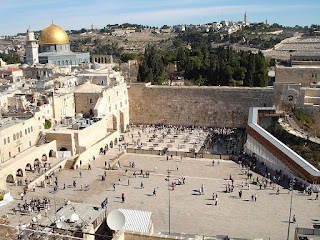 |
| The Western Wall |
God’s Presence: In the Present (The Times of the Gentiles)
But until He returns, Jesus predicted that “Jerusalem shall be trodden down of the Gentiles, until the times of the Gentiles be fulfilled” (Luke 21:24). Currently on Mount Zion where for a time Yahweh chose to dwell amidst Israel, reside two Islamic Mosques—the Mosque of Omar at the center of the mount and the Al-Aqsa Mosque a short distance to the south.[10] The mosques are a real and symbolic reminder of the judgment Jesus announced, that beginning with the Roman conquest of 70 AD, Jerusalem would remain “trodden down… until the times of the Gentiles be fulfilled.” The end of this great interim of Gentile ascendancy will be signaled by Gog’s grand alliance invading Israel and the Lord’s intervention on behalf His threatened people. The end of the era of Gentile domination will commence when Gentile Gog and his allies are defeated and their remains buried in “the valley of the passengers on the east of the sea” (Ezekiel 39:11, KJV; The Valley of the Travelers, ESV).[11] As the divine judgments of the Babylonian Captivity (BC 586) and Roman invasion (70 AD) signaled the beginning of “the times of the Gentiles,” so the divine judgment of Gog and his Gentile allies will signal the beginning of the end of Gentile ascendancy in the world. From the way the nations are lining up over the Middle East, this could happen at any time. Meanwhile, during this era (“the times of the Gentiles”), God’s worldwide presence will continue to be resident in the true Church. For reason of the Holy Spirit baptizing all believers into union with Christ and each other, the church is the temple of God (See 1 Corinthians 12:13.). As the Apostle Paul asked the Corinthians in the hope of deterring their canal attitudes and self-indulgence, “Do you not know that you are the temple of God and that the Spirit of God dwells in you?” (1 Corinthians 3:16; Compare 2 Corinthians 6:16.).
God’s Presence: In the Future
But to vindicate His name on earth for having chosen Abraham’s descendants as His people, Israel as His Land, Jerusalem as His city, and Mt. Zion as His mount, the Lord has ordered that a future Temple will be built to house His glory and honor His name in Israel and among the nations (Ezekiel 40-48). “I will set my glory among the nations,” the Lord announced to Ezekiel (Ezekiel 39:21; Compare 43:2, 4, 5; 44:4.). Then as the Prophet Micah describes,
—Micah 4:1-2, KJV (Compare Isaiah 2:2-4; Zechariah 8:3.)
In the last or latter days, the Temple of the Lord will be rebuilt, and after having been profaned by the Anti-Christ “whom the Lord will slay with the breath of His mouth,” the personal glory of the Lord, after a hiatus of two and one-half millennia, will return to dwell there (2 Thessalonians 2:1-12; Ezekiel 43:5, “Behold, the glory of the Lord filled the house.”). By filling the future temple with His glory the Lord’s name will be exonerated in Israel and vindicated before the nations. The way it will be will be the way it should have been.
Summary
The current conflict in the Middle East is deeply rooted in the past because there in that place heaven met earth, and there will earth will meet heaven again. The land of Israel and Jerusalem represent “the king” in the international chess game going on for controlling that part of the world, which in the grander picture indicates the long war being fought by unbelieving Gentile nations against the Lord and His Anointed (Psalm 2:1-4). This land the Lord calls “My land” (Isaiah 14:25; Jeremiah 2:7; 16:18; Ezekiel 35:14; 36:5; 38:16*; Joel 1:6; 4:2), and the end time invasion and war will be over the territorial rights to it. In the unfolding of the events of Bible prophecy including Ezekiel 38-39, this land is the ground zero. To whom does the land belong, to God or to Gog? The current dispute over Israel serves to magnify that the land belongs to God and the people to whom He gave it, something which “the rulers… powers… forces of this darkness” absolutely defy and oppose (Ephesians 6:12). This then raises the second question.
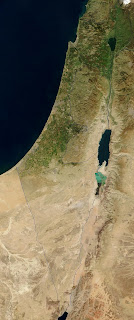 |
| Israel viewed by satellite |
2. When will the invasion take place?
In “the last days”
A marker exists as to when the invasion will take place; that time frame is, “in the latter years [Hebrew, be’achariyth ha’shaneim]… the last days [Hebrew, be’aharit ha’yamim]” (Ezekiel 38:8, 16, KJV). Though sharing some similarities with the New Testament’s designation of “the last days” (i.e., the period of time between Jesus’ incarnation and Second Coming, Hebrews 1:2 and Acts 2:17), Ezekiel’s concept of latter-years/last-days relates distinctly to Israel’s future. Indicating the particular relevance of the last or latter days to Israel, the angel Michael told the prophet Daniel, “Now I am come to make thee understand what shall befall thy people in the latter days” [Hebrew, be’aharit ha’yamim]” (Emphasis added, Daniel 10:14). So taking our cue from Michael’s statement, we may understand that the invasion will take place at the time when both the national history of Israel and the times of the Gentiles are drawing to a close.
The time of it is future because the Apostle John envisioned the invasion of Gog and Magog as yet future from him (Revelation 20:8).[12] Commentator Peter C. Craigie confirms: “Certainly in New Testament times, the chapters [Ezekiel 38-39] were interpreted in an apocalyptic fashion (see e.g. Rev. 20:8), indicating that it was believed that their substance referred to a still distant future.”[13] Stuart concurs that Gog’s armies “constitute an eschatological army at the end of human history, ready to fight a special battle different from those that have characterized every era in the past.”[14] But there are other features in the text that mark when the invasion will take place.
 |
| Aliyah: Jews returning to their homeland |
After the Diaspora and Re-gathering of the Jews
The invasion of the end will take place after a Jewish Diaspora (this refers to the God’s judgment upon the Jews by using foreign enemies to drive them from their homeland into locations throughout the world) and then after a re-gathering of the Jews to their homeland, the Holy Land. As the Lord summarized His judgment on Israel to Ezekiel, “I made them go into exile among the nations, and then gathered them again to their own land” (Ezekiel 39:28). So after His people had been exiled from and re-gathered to His land, the Lord informs Prince Gog that, “After many days you [Gog] will be summoned; in the latter years you will come into the land that is restored from the sword, whose inhabitants have been gathered from many nations… [who] were brought out from the nations”; and that the leader would come “against the people who are gathered from the nations” (Ezekiel 38:8, 12; Compare Ezekiel 39:27-28). So as to the time of the invasion, Charles Feinberg (1909-1995), a converted Jew and Hebrew scholar, commented that if interpreted literally, the chapters (Ezekiel 38-39) tell of “a coming northern confederacy of nations about the Black and Caspian seas with Persia [i.e., Iran, ed.] and North Africa, who will invade the promised land after Israel’s restoration to it.”[15]
Now some readers will ask, “What exile and restoration is Ezekiel prophesying of?” After all, the Jews have experienced more that one restoration to their land in history. It can be deduced that the exile/restoration could not have been that of the Babylonian Captivity because when Ezekiel wrote his prophecy the Jews already were exiles in Babylon (Ezekiel 1:1-3). Neither does the exile/restoration led by Ezra and Nehemiah fit Ezekiel’s prediction for several reasons. First, the invasion would take place near the end of Israel’s national history, “in the last days” (Ezekiel 38:16; Daniel 10:14). Second, from his apocalyptic perspective the Apostle John marks Gog/Magog to be yet future (Revelation 20:8).[16] Though not determinative of the timing, “Rabbinic tradition places Gog after the days of the Messiah.”[17] And third, if it is argued that the invasion by the Romans in 70 AD fits the invasion Ezekiel predicted, then it must be asked, “Where was the divine intervention and devastating defeat of the invaders by the Lord as Ezekiel portrays will be the case? (Ezekiel 38:18-22; 39:3-20) In 70 AD and as predicted by Jesus, only invasion of and devastation by the Romans occurred (Matthew 24-25). There was no divine deliverance. As Dr. Harry Rimmer (1890-1952) noted, “While it is the custom for certain schools of interpretation to seek to ascribe all prophecies to some past historical fulfillment, such a technique of over-simplification will not serve here.”[18]
Without divine intervention, the vast majority Jews were exiled from their homeland (marking the beginning of “the times of the Gentiles”) by the Romans in 70 AD. Among the nations most Jews remained for 1,900 years. Then after the Holocaust and World War II, as portrayed in the movie Exodus, they began and continue to immigrate back to Israel. Because of ongoing persecution elsewhere in the world, even more Jews are making their way back the Land. Because of rising persecution in France and other European countries, Israeli Prime Minister Netanyahu is encouraging Jews to return to Israel. So as described by Ezekiel and other prophets (Ezekiel 38:17), Gog’s invasion belongs to a time frame in the modern era after Israel’s exile from (70 AD) and re-gathering to the Promised Land (circa 1948-Present), a national restoration approximate to the end of history as we and the world know it. As noticed by the modern return of the Jews to the Holy Land after their first century dispersion and Russia’s assertiveness in that region, the general time frame for Gog’s invasion of Israel, as predicted by Ezekiel, has been set. We’re on the prophetic clock ticking toward it. Though the general time of Gog’s invasion of Israel is indicated by the prophet (i.e., in the last or latter days of Israel’s history), the precise time of Gog’s invasion is difficult to establish.
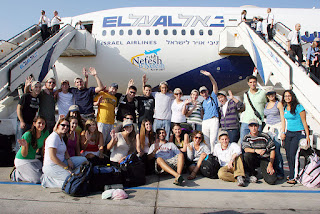 |
| Aliyah, circa 2007 |
Before Jesus’ Parousia and Kingdom
Generally it can be noted that according to the Old Testament prophets, Jesus and the Apostles, God’s historical and prophetic calendar involves two ages in three phases: this present evil age (the time we’re living in), the end of the age or the Day of the Lord (the time this planet seems to be approaching), and age to come (the Kingdom of God). (See Matthew 12:32; 13:39; Mark 10:30; Luke 18:30; 2 Thessalonians 2:1-12.) Together, they predicted the events that would characterize the end of this age—spiritual apostasy, escalating moral corruption, wars, pestilences, natural disasters, Anti-Christ’s coming, the tribulation, the translation of the church, etc. Though evident for centuries, Jesus said that during this present age (i.e., “the times of the Gentiles”) these crises would like “birth pangs” escalate in both frequency and intensity as time progressed (Matthew 24:8; Luke 21:12-24). Gog’s invasion will be part of the cluster of events announcing “the end of the age” and Jesus’ coming to establish His Messianic Kingdom on earth (Matthew 24:3; Revelation 20:1-10). Gog’s invasion of Israel will in my view, put the world on notice that the end of the age has arrived and God is transitioning this planet to establish His rule. In short, Russia’s invasion is an ominous prelude to the Day of the Lord, the time during which, as Jesus predicted, God will end of “the times of the Gentiles” by judging this earth to prepare it for establishing His Kingdom (Matthew 24:3-31; Revelation 6:1-19:21). This brings us to the next question.
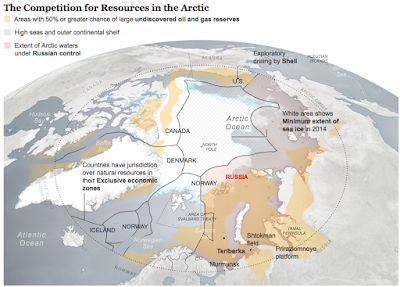 |
| Exhibit A: Arctic political map from an article by Steven Lee Myers in the New York Times, 8/29/15, “U.S. Is Playing Catch-Up With Russia in Scramble for the Arctic.” |
3. Who will invade the Holy Land?
His name is “Prince Gog,” and he is the ideological, demagogic and perennial antagonist against Yahweh and His chosen people. So in “latter days” he will instigate a full scale invasion of the Holy Land. Gog will assault “the land” from “the remote parts of the north”; from “the remote parts of the north”; and from “the remotest parts of the north” (Ezekiel 38:6, 15; 39:2). Literally, the word remotest (Hebrew, yarekah) refers “to the backside or farthest part of anything.”[19] With Jerusalem serving as the geographical orientation point, the “center of the world” (Ezekiel 38:12), “The remotest parts, particularly the distant north, are conceived of as those away from God [geographically as well as spiritually, ed.].”[20] Thus, there should be no confusion regarding the direction from which the invasion originates, or doubt about its godless agenda to confiscate the land and obliterate its occupants. So whereas Ezekiel deals earlier in his prophecy with the Lord’s judgment of the nations near the time of the Babylonian Captivity (Ezekiel 25:1-32:32), in these chapters he covers the judgment of nations who became Israel’s enemy after the nations last days restoration. But just who is Gog and his confederates who will invade Holy Land in the last of days?
Gog
Gog can mean “mountain.” In ancient times mountains were symbols of power and often believed to be dwelling places of gods. So Gog can be understood as a powerful political and spiritual ruler who according to Genesis, was the second son of Japheth whose descendants (i.e., the Indo-Europeans) settled in the vicinity of and to the north and west of the Black and Caspian Seas (modern day Ukraine and Russia).[21] We know from the text that not only will Prince Gog rule over his namesake Magog, but also over three additional ethnic/national groups who will take part in the invasion: Rosh, Meshech and Tubal (Ezekiel 38:2: 39:1).[22] Also, Gog will be allied with Togarmah (the preface Beth means “house of”) who like Gog hails from the “remote parts of the north” (Ezekiel 38:6—perhaps Siberia); with Gomer from the nearer north (the region of Ukraine); with Ethiopia and Put from the south (the region of Egypt and Africa); and with Persia from the east (the region of Iran and Iraq). (See Ezekiel 38:5-6.) Establishing precise geographical equivalence between ancient nations and modern ones is difficult because of the ancient flux of tribal migrations and national boundaries.[23] Nevertheless, the names are well attested by historians (Josephus, Hesiod). So this is the geographical lineup of the grand alliance of nations that under Gog’s leadership will invade restored Israel in the “latter days.”
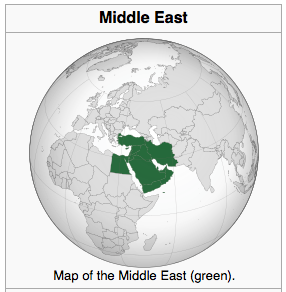 |
| https://en.wikipedia.org/wiki/Middle_East |
Is “Rosh” Russia?
Consistent with the proper names that follow (i.e., Meshech and Tubal), the Hebrew dictionary classifies Rosh (Hebrew, rosh) as a proper name (NASB, ASV, NKJV), and not an adjective (i.e., “chief” prince of Magog, KJV, NIV, NRSV).[24] Thus, Ezekiel presents Gog to be the head of Magog, a confederation of northern states or tribal groups including Rosh, Meshech and Tubal. Regardless of the geo-politics involved, a leader named “Prince Gog” or “Gog the Prince” will lead a confederation of armies to invade Israel after Jews from all over the world have been re-gathered to Palestine (Ezekiel 36:24; 37:21; 38:12; 39:27-28). Prince Gog will hail from “the remotest parts of the north” (Ezekiel 39:2) and the invasion will take place in “the last days” (Ezekiel 38:16).
Though the invasion will originate from the territory of Russia, it is unlikely that Rosh means Russia.[25] (See footnote 23.) Also, one expert and popular author’s identification of Gog to be Turkey is too narrowly focused.[26] The exegetical, geographical and historical data in Ezekiel suggests the invasion will involve a grand alliance of nations led by a geo-political leader who will descend upon Israel from “the remotest parts of the north [not near north like Turkey, ed.].” In this regard, Vladimir Putin’s seizure of Crimea (near north form Israel) and recent military excursions in the Arctic (far north from Israel) to establish Russia’s preeminence in those northern regions ought to be noted. As warming temperatures may perhaps make the Arctic region more hospitable and accessible for energy exploration and extraction, Russia has already planted a titanium flag at the bottom of the Arctic Ocean claiming a vast part of the area (about the size of South Africa) for purpose of controlling its “territorial waters, transit routes and especially its natural resources… in a rivalry some already call a new Cold War.”[27] We can note that a nation can get no further north than the north pole!
4. Why will Gog invade?
Though the immediate reason for invasion of Israel is economic (Ezekiel 38:13), the ultimate reason is that Israel and the nations will recognize Yahweh as God! (You or They “will know that I am the Lord.”) In the ancient as in the modern world, the Lord (Yahweh) was/is not well known. So repeatedly (upwards of 80 times) in chapters 6-39 of Ezekiel’s prophecy, the statement, “you” (referring to Israel) or “they” (referring to the Gentile nations) “will know that I am the Lord” (To Israel—Ezekiel 37:13; 39:22, 28; To the Gentiles—Ezekiel 36:23; 37:28; 38:16, 23; 39:7). Throughout the last 4,000 years of human history, both Israel and her Gentile enemy-nations share something in common: They did/do not know the Lord! So the prophecy of Ezekiel is about the nations coming to know the Lord: Israel will come to know the Lord for reason of His protection of them, and the Gentiles will come to know the Lord for reason of His devastation of them.
The Credibility of God and His Word
From among the international community of nations in the ancient world, God chose Israel with whom to have a special relationship (Deuteronomy 7:6). Out of Israel the Lord promised Messiah would come to not only bless Israel, but also the nations (Genesis 49:10; Isaiah 42:1; 49:6). But as evidenced by their continual strategizing against the Lord, His Messiah and Chosen people, the Gentile nations do not want that blessing. The nations have and are continuing to plot together “Against the Lord and His Anointed.” They say, “Let us tear their fetters apart / and cast away their cords from us” (Psalm 2:1-3). The nations and secular Jews also, do not want God’s rule on earth. Further, these same nations who plot against Yahweh’s rule also “make shrewd plans against [the Lord’s] people, and conspire together against [the Lord’s] treasured ones [i.e., Israel]” (Psalm 83:3).
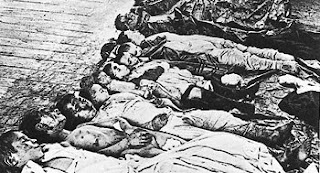 |
| The victims of a 1905 pogrom in Yekaterinoslav |
As the historical persecutions, pogroms and holocausts directed against the Jewish people attest, the conspiracy is no secret. The continual byline among the nations continues to be, “Come, and let us wipe them [Israel] out as a nation, that the name of Israel [and Israel’s God] be remembered no more” (Psalm 83:4). Gog’s future invasion of Israel must be understood against the backdrop of the nations’ perennial hatred for the Lord and His people.
In this final invasion, nothing less than God’s credibility is at stake; first to Israel regarding the ancient promises He made to that people, and then before the Gentiles who have despised God’s covenanting with Israel and her consequent prominence in world history. To attack God, they go after the people God pledges loyalty to. If unbelieving nations are able to destroy the inheritors of God’s promises in the Bible (e.g., Israel and the Church), then they imagine they will have discredited Lord and shamed His Word. This is the perennial conspiracy of the Gentiles Psalm 2 describes where the Psalmist asks, “Why are the nations in an uproar and the peoples devising [imagining, contemplating, ed.] a vain thing?” (Psalm 2:1). In modern history, Hitler’s gas chambers, continuing anti-Semitism, militant Islam’s agenda to destroy Israel, and ISIS’ targeting of Jews and Christians for death by beheading gruesomely illustrate the residual hatred in the world for Yahweh.
Among Jewish Apostates
In her apostasy, Israel profaned the Lord’s name when in unbelief the nation forsook worshipping the one true God to pursue “the detestable things” of the occult and the licentious worship at idolatrous “high places” scattered throughout the land Israel (1 Kings 11:4-8). The name of the Lord was not sanctified in Israel and consequently neither among the nations (Ezekiel 36:23). Even in the Temple the Jews abominated the name of the Lord (Ezekiel 8:5-18). It has been pointed out that in the migration of Jews back to their homeland there was “a certain class” of them “who were Jews in name and lineage only. That… were impregnated with higher criticism and in some cases literally atheistic, and they despised Moses and the Law.”[28] So in light of His people’s idolatry, ancient and modern, the Lord has said, “My holy name I will make known in the midst of My people Israel; and I will not let My holy name be profaned anymore” (Ezekiel 39:7a). And again, “The house of Israel will know that I am the Lord their God from that day [the day of Gog’s defeat] onward” (Ezekiel 39:22).
To validate His covenant with Israel, the Lord punished His people by activating enemy nations to invade and occupy the Land—the Assyrians (733 B.C.), Babylonians (599-597, 587-586 B.C.), Greeks (322 B.C.), Romans (B.C. 63-A.D. 70), Muslims (636 A.D.), Crusaders (1097, 1191), Mongols (1260, 1300), Turks (1516) and Britain (1917)—forcing Jews to disperse over the world. All of this caused Israel to become a laughing stock among the nations. As the Lord said to Israel through Ezekiel, “Those who are near and those who are far from you will mock you, you of ill repute, full of turmoil” (Ezekiel 22:5; See Psalm 79:4; 80:6; Daniel 9:16). But God will vindicate Himself and end the mockery. But how will God bring this about?
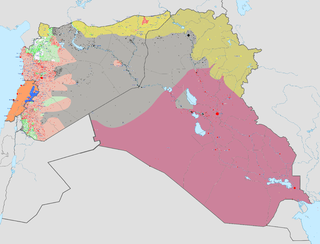 |
| A map of ISIS influence and control, 9/4/15 |
Before Gentile Scoffers
He will do so by vindicating Israel’s chosen status in the eyes of the nations by waging a final battle against them sometime “in the latter years” of Israel’s earthly history (Ezekiel 38:8; Daniel 10:14). God will cause the nations under Prince Gog to invade the Land of His people, the Holy Land. “I will turn you about and put hooks into your jaws,” says the Lord, “and I will bring you out” (Ezekiel 38:4; See 39:2). God will hook Gog in the jaws and steer him and his confederates (i.e., Turkey, Syria, Iran, Libya and Ethiopia) to invade His Land, Israel.
The Lord will do so to magnify Himself in the eyes of the world. Several times in these chapters this purpose the Lord personally addresses the reason for the invasion:
- It shall come about in the last days that I will bring you against My land, so that the nations may know Me when I am sanctified through you before their eyes, O Gog. (Ezekiel 38:16)
- I will magnify Myself, sanctify Myself, and make Myself known in the sight of many nations; and they will know that I am the Lord. (Ezekiel 38:23; 39:13)
- And the nations will know that I am the Lord, the Holy One in Israel. (Ezekiel 39:7b)
- And I will set My glory among the nations; and all the nations will see My judgment which I have executed and My hand which I have laid on them. (Ezekiel 39:21)
Can there be any doubt about God’s purpose of hooking and dragging that confederacy of nations to invade Israel? It’s to magnify Himself and make His glory seen and known by the nations of the world. And at the sight of the confederate invasion, surrounding Arab countries will not idly stand by as spectators. They too (Saudi Arabia, Egypt, Jordan, Syria, Iraq—the Islamic State of Syria and Iraq, or ISIS?—and Iran will broker agreements with Gog/Russia to protect their regional interests and plunder the Promised Land (Ezekiel 38:13). In the full scale invasion by Gentile nations from Israel’s north, east, south and southwest, nothing less than the honor and reputation of Yahweh is at stake in this modern world! This raises the fifth question.
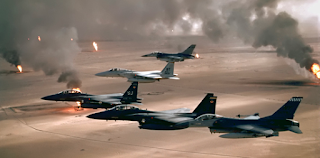 |
| Desert Storm Gulf War 1991 |
5. What will happen to the invaders?
Ezekiel describes an invasion of Israel/Palestine unlike any that happened before in the history of that small geographical area of the world. As God describes the overwhelming force of the invasion, He says that Gog and his armies, like a swarm of locusts or a dust storm, “will come up against My people Israel like a cloud to cover the land” (Ezekiel 38:16; See 38:9.). As far as can be seen by the naked eye, enemy troops and their armaments will cover the land. With overwhelming force and from every direction, from the north, the east, the south (and perhaps, though unspecified in the text, by an amphibious assault from the Mediterranean Sea), the Holy Land will be assaulted. For the Jewish nation, there will be no way of escape. There will be nowhere to run and no place to hide from the swarming enemy. (Compare Matthew 24:15-22.)
But as illustrated by the angel of the Lord’s defeat of 185,000 Assyrians in the days of Hezekiah (2 Kings 19:35; Isaiah 35:36), those invaders will be devastatingly defeated (Read Ezekiel 39:3-6.). For seven years the inhabitants of the cities will warm themselves over fires burning with the “shields and bucklers, bows and arrows, war clubs and spears” remaining from the mass of invading armies (Ezekiel 39:9). “For seven months the house of Israel will be burying them [Gog’s invading horde] in order to cleanse the land” (Emphasis added, Ezekiel 39:12). Such a futuristic battle employing primitive weapons such as bows and arrows, shields and spears, horses and wagons is thought by critics to be too primitive an understanding of modern warfare and combat. But it can be noted that a high altitude nuclear explosion (HANE) would disrupt the earth’s electro magnetic pulse (EMP) which is essential for the functioning of modern weaponry.[29] Thus Ezekiel’s description might not be so archaic after all. This brings us to the final question.
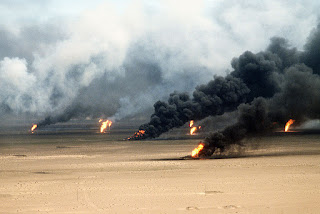 |
| Kuwait oil well fires, 1991 |
6. Who instigates the invasion?
All of this will happen in accord with God’s providential working. In the international game of national self-interest and residual hatred of God’s people, the Lord is the Master and the nations are His pawns. Through His prophet the Lord speaks to Gog:
- Thus says the Lord God, “Behold, I am against you, O Gog, prince of Rosh, Meshech and Tubal. I will turn you about and put hooks into your jaws, and I will bring you out, and all your army, horses and horsemen, all of them splendidly attired, a great company with buckler and shield, all of them wielding swords; Persia, Ethiopia and Put with them, all of them with shield and helmet; Gomer with all its troops; Beth-togarmah from the remote parts of the north with all its troops—many peoples with you. . . . After many days you will be summoned; in the latter years you will come into the land that is restored from the sword, whose inhabitants have been gathered from many nations to the mountains of Israel which had been a continual waste; but its people were brought out from the 1nations, and they are living securely, all of them.
—Emphasis added, Ezekiel 38:3-6, 8 - Behold, I am against you, O Gog, prince of Rosh, Meshech and Tubal; and I will turn you around, drive you on, take you up from the remotest parts of the north and bring you against the mountains of Israel.
—Emphasis added, Ezekiel 39:2 - “Behold, it is coming and it shall be done,” declares the Lord God. “That is the day of which I have spoken.”
—Emphasis added, Ezekiel 39:8
So we have it. The reason for the grand alliance’s invasion of God’s land is because He orders it. God transforms self-interest on the part of the nations into an obsession to control His land and destroy Israel. As one commentator states by quoting another: “There is no inconsistence here: ‘a divine purpose overrules, while it makes use of, the base human motive’.”[30] As the Psalmist declared, “Surely the wrath of man shall praise thee” (Psalm 76:10, KJV).
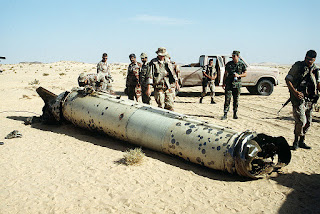 |
| A Scud missile directed at Israel |
Conclusion
In that war torn and volatile region of the world 2,500 years ago, Ezekiel prophesied and described the last battle of Israel in the last days. Coveting the resources and wealth of the Middle East, a grand alliance of nations, led by Gog who hails from “the remote parts of the north,” will invade the Holy Land. There God will devastatingly defeat that enemy confederacy. For the final time the Lord will intercede for Israel that He might be glorified among His people and the rest of the nations of the world. The Gentiles will be served notice that the times of their ascendancy is over.
That the leader of the invading grand alliance hails from “the remote [not near, ed.] parts of the north” leaves Russia as the best modern candidate to be identified as Prince Gog, the leader of this end-of-days invasion. Russia alone occupies the geographical region that is remotest north. Of Russia Winston Churchill (1874-1965) once remarked:
I cannot forecast to you the action of Russia. It is a riddle, wrapped in a mystery, inside an enigma; but perhaps there is a key. That key is Russian national interest.[31]
God will use her national interest to drag Russia from the remotest north into a war with Israel in the latter days. The Lord will “turn [Gog/Russia, ed.] about and put hooks into your [their] jaws” and like a fish on a line, haul the confederacy of nations into a final conflict over control of the Middle East. Portending just such an invasion, Russia under Vladimir Putin’s leadership has already invaded and annexed Crimea (spring of 2014). Of the Crimean seizure an observer has written: “It was instead the opening gambit in a new style of global competition—one that, in the Middle East, Russia and its clients are winning and the United States, despite huge natural advantages, is losing.”[32] Putin’s continuing agitation in eastern Ukraine may also indicate that his agenda involves moving further south.
Recently Russia, after international monetary sanctions were lifted by the brokered nuclear arms treaty between the U.S. and Iran and approved by the United Nations, saw the green light the treaty offered and sold Iran highly advanced S-300 surface-to-air missiles, a deal that Putin reneged out of five years ago. This highly advanced weapon-system will make Iran invulnerable to an air attack by Israel or other nations. With the potential to develop a nuclear weapon given by the treaty in the future, Iran will develop a bomb. (For all we know, Iran may already have a nuclear weapon.) And when that bomb is developed, who knows whether that Shiite state will preemptively strike Israel to introduce the apocalypse that will instigate the return of the 12th Imam and the instituting of a worldwide Islamic Caliphate?
Add to this deadly international self-interest stirring the cauldron in that part of the world, ISIS is arising (the Islamic State of Iraq and Syria). These barbarians, even as they behead Christians and Jews and destroy their historic religious sites thousands of years old, desire to establish an Islamic Caliphate governed by Sharia law. The Caliphate is believed to be a precursor to the kingdom of the Mahdi or 12th Imam. “While his [al-Mahdi’s] reign is often understood as being an inward or spiritual one, it has also been interpreted as being outward and temporal, a new universal Caliphate.”[33] By exploding a nuclear bomb in the region, ISIS in conjunction with extremist factions within Iran may attempt to induce the coming of the messianic Mahdi to establish a grand world-wide Caliphate. Who knows? Anything can happen. The kingdoms of this world will ever be in competition with the Kingdom of God until Jesus the Messiah establishes His at the end of the age after He comes again.
To this point, it should be noted that, contradicting the propaganda being put out by the West that the war is being won, it is in fact being lost. ISIS is not going away. Several months ago it was reported that,
The war against ISIS is taking a dangerous, perhaps inevitable turn. The terror organization has been keen to expand to southern Syria and the Syrian capital of Damascus. Now it says it has recruited three Syrian rebel groups operating in the south of the country in an area bordering the Israeli occupied Golan Heights—that have switched their loyalties to ISIS.[34]
All this writer is attempting to do is not interpret prophecy by current events, but rather draw attention to the fact that the entire region surrounding Israel—to the north (remotest), the east and the south—seems to be readying itself for the latter days conflagration Ezekiel predicted two-and-one-half millennia ago. The alignment of nations against and the antagonism of nations toward Israel are set. Are we living in the days which the prophet predicted? More and more, it’s beginning to look like it. The insular bubble of those who deny it could burst at any moment causing chaos in that part of world, if not the whole world. Where might the stock market go then?
But we who believe Holy Scripture and the accuracy of the biblical prophets rest in the faith that in this whole international mess, God is at work. He is preparing Gentile adversaries of His chosen people to invade the Holy Land and bring final defeat upon them ending their domination over the Jews. Of the intent of His intervention, the Lord states:
and make Myself known in the sight of many nations;
and they will know that I am the Lord.
Endnotes
[1] Over the last several months, Secretary of State John F. Kerry has been attempting to negotiate a nuclear arms treaty with Iran. Recently the deal has been completed, a treaty which will eventually guarantee that Iran, a terrorist state, will possess nuclear weapons. Critics of the deal protest that it is “no deal” because in order to give the appearance of a treaty, the West has capitulated to Iran and given them everything they wanted. Economic sanctions will be removed from off Iran’s back. That nation will self-inspect its nuclear sites and report the results to the international community of nations. (Imagine . . . the Iranians are on the “honor system”!) The point: Iran will sooner rather than later become a nuclear power broker and player in the volatile area known as the Middle East. What was a dangerous situation will now become treacherous.
[2] Michael Doran, “Ukraine Reveals to Us How Vladimir Putin Sees the Middle East,” Brookings, April 4, 2014 (http://www.brookings.edu/blogs/iran-at-saban/posts/2014/04/04-vladimir-putin-ukraine-reveals-his-view-of-middle-east-iran).
[3] Tom Porter, “Russia and Iran agree deal on delivery of S-300 missiles,” International Business Times, August 19, 2015 (https://uk.news.yahoo.com/russia-iran-agree-deal-delivery-122921136.html#n0zUh9x).
[4] Ibid.
[5] Peter C. Craigie, Ezekiel: The Daily Study Bible Series (Louisville, KY: Westminster John Knox Press, 1983): 265.
[6] Christopher J.H. Wright, The Message of Ezekiel: The Bible Speaks Today (Downers Grove, IL: Inter-Varsity Press, 2001): 317.
[7] Ibid: 321.
[8] David L. Larsen, Jews Gentiles and the Church: A New Perspective on History and Prophecy (Grand Rapids, MI: Discovery House Publishers, 1995): 270.
[9] Militant Islam, as expressed by the Shiite minority (They are literalists in interpreting the Koran and enforcing strict Sharia Law.), believes in the coming of a messianic Twelfth Imam or Mahdi who is destined to rescue the world from the coming end-of-world apocalypse and thereafter establish a worldwide Islamic Caliphate and introduce the eternal state. Some within Shiite Islam, called “Twelvers,” believe that the coming or revealing of the 12th Imam (a prophet equal to Muhammad, with supernatural knowledge and authority, and who mediates between man and God) can be facilitated by initiating an apocalypse (via a nuclear exchange?) that will force the Mahdi to return and rescue the world. After all, if terrorist states and groups use little explosions to defeat the enemy or Great Satan, why not use a big one? To this point, we should know that Iran is Shiite.
[10] As an indication of God’s judgment, currently Jews do not have access to the Temple Mount but only to the area at the west below Mount Zion. The base of the mount, which area Israel has controlled since the 1967 Six Day War, Jews have transformed into a large open air Jewish Synagogue known as the Western Wall.
[11] To be distinguished from the valley of Megiddo where the Battle of Armageddon will take place after the Tribulation (Revelation 16:12-16), the Valley of the Travelers (ESV), which was a major trade route in ancient time to the east of the Dead Sea, will become the burying place for Gog and his invading Gentile hordes.
[12] Interestingly, though not determinative of the fulfillment of Ezekiel’s prophecy, Islam believes that the “last days before the end of the cycle of manifestation” (referred to in the above footnote) will be “marked by the figures of Gog and Magog (Juj wa Majuj), the Mahdi, the Antichrist (Dajjal), and Jesus.” See Cyril Glassé, “Eschatology,” The New Encyclopedia of Islam (Walnut Creek, CA: AltaMira Press, A Division of Rowan & Littlefield Publishers, Inc., Revised edition, 2001): 127.
[13] Craigie, Ezekiel: 266. The two mentions of Gog and Magog, in Ezekiel and Revelation, do not indicate they are the same invasion. In fact the circumstances surrounding them separate them. I use Craigie’s quote only to suggest that both invasions/battles are prophetic and refer to the era when history as we know it, is drawing to a close.
[14] Douglas Stuart, Ezekiel: The Communicator’s Commentary, Lloyd J. Ogilvie, Editor (Dallas, TX: Word Books, 1989): 356.
[15] Emphasis added, Charles Lee Feinberg, The Prophecy of Ezekiel: The Glory of the Lord (Chicago, IL: Moody Press, 1969): 218.
[16] I realize that many expositors do not equate the “Gog and Magog” of John’s Revelation with the “Gog and Magog” of Ezekiel’s prophecy as the invasion pictured by John is at the close of the Millennium. I compare the two only to establish that the re-gathering from the Babylonian exile (circa late 6th-early 5th centuries BC) under Ezra-Nehemiah was not the re-gathering Ezekiel envisioned. The return of the Jews at that time does not qualify as a return in “the latter days.”
[17] Harry Rimmer, The Shadow of Coming Events (Grand Rapids, MI: Wm. B. Eerdmans Publishing Co., 1946): 96.
[18] H.L. Ellison, “Gog and Magog,” The New Bible Dictionary, J.D. Douglas, Editor (Grand Rapids, MI: Wm. B. Eerdmans Co., 1962): 481.
[19] John E. Hartley, “yrk,” Theological Wordbook of the Old Testament, Volume I, R. Laird Harris, Editor (Chicago, IL: Moody Press, 1980): 408.
[20] Ibid.
[21] “‘Magog,’ associated with the Japhetic line in the table of nations in Genesis 10, is referred to by Josephus (Antiquities of the Jews, 1.6.1) as the Scythians who lived in and around the Black and Caspian seas.” See Ralph Alexander, Ezekiel (Chicago, IL: Moody Press, 1976): 122.
[22] Translations vary as to whether “prince” (Hebrew rosh meaning “head”) should be understood as an adjective or a noun. If an adjective, then Gog is the “chief prince” of two nations, Meshech and Tubal (See KJV, TEV, ESV, and NRSV.). If a noun, then Rosh refers to a third kingdom over which Gog rules. Gog then is “prince” over Rosh, Meshech and Tubal (See ASV, NASB, NKJV, Young’s Literal, and Darby.). To view “rosh” as an adjective is, in my view, redundant. Why call Gog “chief prince” when he already is a “prince.” Consistent with the proper names that follow (i.e., Meshech and Tubal), one Hebrew dictionary classifies Rosh (Hebrew, rosh) as a proper name (“Rosh”) and not an adjective (“chief”). See Francis Brown, The New Brown-Driver-Briggs-Gesenius Hebrew and English Lexicon with an Appendix containing the Biblical Aramaic (Peabody, MA: Hendrickson Publishers, 1979): 912, Strong’s #7220, IV. Therefore Gog is a ruler over Rosh, Meshech and Tubal.
[23] The historian Josephus recorded that, “those whom to-day the Greeks now call Galatians were named Gomerites, having been founded by Gomar. Magog founded the Magogians, thus named after him, but who by the Greeks are called Scythians.” See Josephus, Jewish Antiquities: Loeb Classical Library (Cambridge, MA: Harvard University Press, 1930): Book I. Chapter vi.1, 61. The Scythians were “Iranian equestrian tribes who were mentioned as inhabiting large areas in the central Eurasian steppes [the region between Europe and Asia] starting with the 7th century BC up until the 4th century AD. See “Scythians,” Wikipedia: the Free Encyclopedia (http://en.wikipedia.org/wiki/Scythians).
Alluding to Magog, the Greek Poet Hesiod (BC 750-650) who was roughly contemporary with Ezekiel, wrote that, “Bochart, in his Phaleg, Book I, Chapter 2, tells Us the true Name of Prometheus [a mythological Greek creator-god] was Magog, who was the Son of Japhet: he is fayed to have been bound to Caucafus [The beautiful mountainous region of the Caucasus Mountains. Remember the Sochi Winter Olympics? They were held in the region of Magog!] becaufe he fettled near it . . .” See The Works of Hesiod, Volume II, “The Theogony, or the Generation of the Gods: Notes to the Theogony,” Translated from the Greek by Thomas Cook (London: N. Blandford for T. Green, 1728): 157. I use Hesiod’s quote merely for purposes of identifying the region where Gog will hail from.
[24] Brown, Brown-Driver-Briggs-Gesenius Hebrew and English Lexicon: 912, Strong’s #7220, IV.
[25] A word about Rosh: Linguistically, attempts to establish “Rosh” to be Russia have been made. The Hebrew scholar from Germany William Gesenius (1786-1842) identified Rosh to be a proper noun referring to “a northern nation, mentioned with Tubal and Meshech; undoubtedly the Russians . . .” This identity is done by arbitrarily transposing a vowel “u” for “o” in the name Rosh to make it read Rush. Though fascinating, conveniently switching vowels to make Rosh be Rush is manipulative. However, we do know that Gog and his kingdoms invade Israel from the “north,” in fact “from the remote parts of the north” (Ezekiel 39:2; compare 38:6.). A glance at any atlas reveals that Russia lies north of Israel as do other of the invading nations, i.e., Syria, Turkey, Georgia, Ukraine, etc. In fact, to the north Moscow lines up almost on the same longitude as Israel to the south! Therefore, based on geographical evidence stated by the prophet, it is justifiable to conclude Ezekiel envisioned an invasion from the north led by Gog-Russia. Russia is the only modern nation that fits the geographical proximity of being from “from the remote parts of the north.”
[26] “I’ve explained that while many prophecy teachers claim that Ezekiel is speaking of a Russia-led invasion of Israel, the historical record and modern scholarship show that it is in fact a Turkish-led invasion.” Joel Richardson, “Ezekiel, Magog and the Scythians,” WND, August 30, 2012 (http://www.wnd.com/2012/08/ezekiel-magog-and-the-scythians/).
[27] Steven Lee Myers, “U.S. Is Playing Catch-Up With Russia in Scramble for the Arctic,” New York Times, August 29, 2015 (http://www.nytimes.com/2015/08/30/world/united-states-russia-arctic-exploration.html?_r=0).
[28] Rimmer, Shadow of Coming Events: 35.
[29] “High-altitude nuclear explosion,” Wikipedia: The Free Encyclopedia (https://en.wikipedia.org/wiki/High-altitude_nuclear_explosion).
[30] John B. Taylor, Ezekiel: An Introduction and Commentary (Downers Grove, Il: Inter-Varsity Press, 1969): 246.
[31] Winston S. Churchill, “The Russian Enigma,” BBC Broadcast, London, October 1, 1939 (http://www.phrases.org.uk/meanings/31000.html).
[32] Michael Doran, “Ukraine Reveals to Us How Vladimir Putin Sees the Middle East,” Brookings, April 4, 2014 (http://www.brookings.edu/blogs/iran-at-saban/posts/2014/04/04-vladimir-putin-ukraine-reveals-his-view-of-middle-east-iran).
[33] Cyril Glassé, “al-Mahdi,” The New Encyclopedia of Islam (New York, NY: Altamira Press, 2001): 280.
[34] Riyadh Mohammed, “ISIS Closing in on Israel from the North and the South,” The Fiscal Times, December 23, 2014 (http://finance.yahoo.com/news/isis-closing-israel-north-south-113000327.html).

